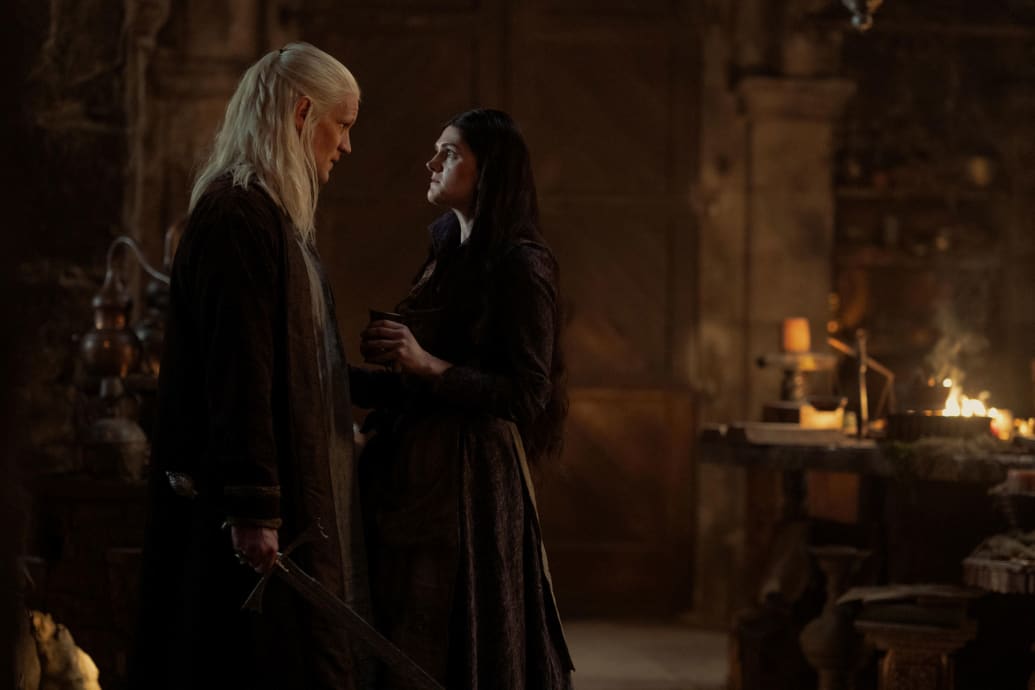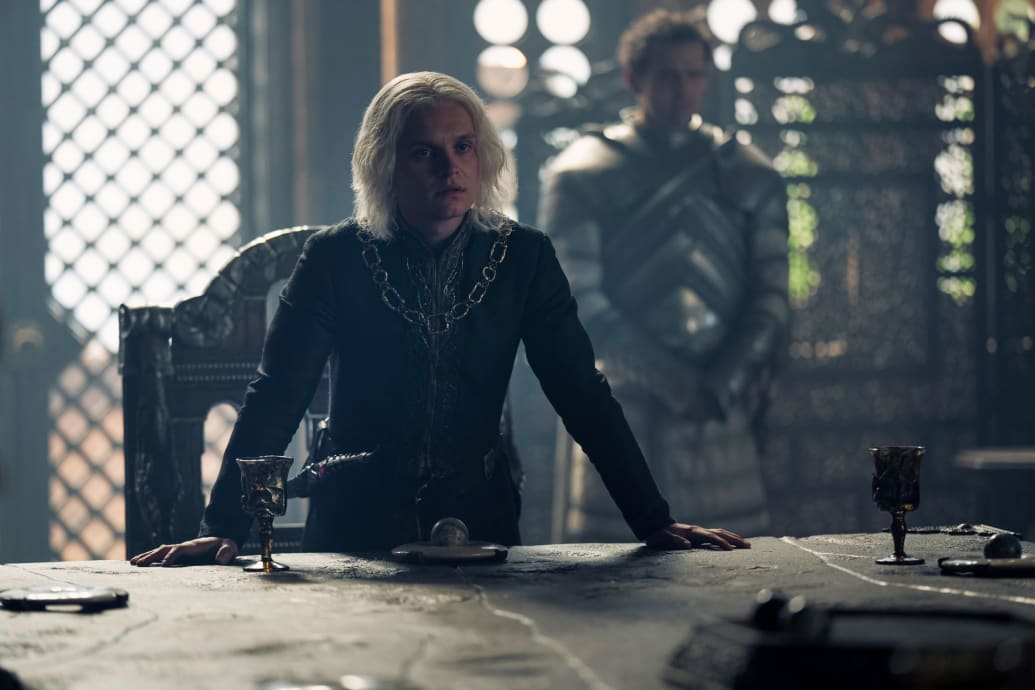Entertainment
‘House of the Dragon’: Who Died in Bloody Dance of Dragons?

(Warning: Spoilers ahead.)
Now we know why we’ve barely seen those CGI monsters for the past few episodes.
In the first half of this season of House of the Dragon, we’ve sat through three episodes all with eerily similar endings, with characters sneaking in where they’re not wanted, whether to assassinate someone or attempt to broker peace in the desperate final hours before all is lost. In Episode 4, titled “The Red Dragon and the Gold,” the net of tension that Westeros has existed under since King Viserys’ death has broken, and both sides now know there’s no way out, except through open war. This is the episode whose shockingly violent final act sets the tone for the rest of the season, as well as the rest of the show. If we’re already here by Episode 4, I shudder to think what Episode 9—traditionally the Game of Thrones/House of the Dragon episode where Shit Gets Real—will have in store.
In the opening of this episode, Daemon (Matt Smith) is still stuck in a Dungeons & Dragons-like side quest, complete with magical visions and a spooky witch in the form of Alys Rivers (Gayle Rankin), an enigmatic local who seems to know a lot more about Daemon than she’s letting on. He’s kept occupied by the conundrum of Harrenhal—it’s too big to defend, its liege lord is absent and elderly, and there’s just no one in there. Plus, it’s haunted, probably by ghosts and probably also by the remainders of the weirwoods felled during the castle’s construction, whose roots still snake through the halls and out of whose heartwood Daemon’s bed was carved. Maybe that’s the reason his dreams and his reality are beginning to blur, sending him revenants of young Rhaenyra (hello again, Milly Alcock!) and his late wife Laena (Savannah Steyn) to fill him with guilt during important strategy meetings.
In King’s Landing, Aegon’s (Tom Glynn-Carney) Small Council is content to let Daemon stew while Ser Criston Cole (Fabien Frankel) methodically gathers forces in the Crownlands, capturing castles and cutting off Dragonstone by land when he’s not cutting off the heads of those loyal to the Blacks. Cole is clearly in his element, his talent for strategy and pure physical violence much more apparent on the battlefield than it is whenever he’s failing to do his job as Hand. Maybe his uselessness on the Small Council is the reason he pushed so hard for war. A political schemer, Cole is not, but it’s obvious that he really is the gifted fighter everyone says he is. You gotta hand it to him, I suppose. Unless you’re Alicent.
Speaking of which, the queen dowager (Olivia Cooke) seems both resigned and very bothered following her illicit meeting with Rhaenyra (Emma D’Arcy) last episode. She takes some contraceptive tea (please stop sleeping with Cole, we’re begging) and recovers from its effects while scouring the history books her late husband collected, no doubt looking for this Aegon the Conqueror story Rhaenyra mentioned. She has two odd conversations, one with Grand Maester Orwyle (Kurt Egyiawan) and one with Larys Strong (Matthew Needham), about why Viserys “changed his mind” about his successor. Orwyle seems as distant and unconcerned as everyone else, reluctant to question the reasoning behind a dead ruler’s decisions. It’s been decided: That’s it.
Her second talk with Larys goes similarly, except this time it’s Alicent explaining that, from here, conflict is inevitable, no matter the cause: “The war will be fought, many will die, and the victor will eventually ascend the throne. The significance of Viserys’ intentions died with him.” It’s almost as if she’s trying to convince herself as well as Larys that it doesn’t really matter if she made a Vhagar-sized mistake.

Sidenote: It’s always jarring whenever characters on this show mention how much or how little time has passed, but especially so in this scene. You’re telling me it only took weeks for everything to get this bad?
And that’s how we get to the final half hour of this episode, which kicks off the Dance of the Dragons. It’s cruelly ironic that, after championing her queen’s caution and chiding Rhaenyra’s Small Council over their warmongering, Rhaenys (Eve Best) is the first dragonrider of the Blacks to perish in battle. She volunteers to ride Meleys to Rook’s Rest, one of the last strongholds against Cole’s army in the Crownlands. It’s the first time a dragon has supported either side in battle—and, notably, the first time we actually see a battle in this season, instead of just the aftermath.
Unfortunately, Cole was planning for this exact problem, and activates Vhagar and Aemond (Ewan Mitchell), with whom and only with whom he’s been communicating all of his moves. Or he attempts to—what actually happens is Aegon shows up unannounced on Sunfyre, after rejecting his mother’s advice to do nothing and let the adults handle it, and Aegon engages Rhaenys first. Exploiting this wrinkle, Aemond has Vhagar dracarys not Meleys but Sunfyre, felling Aegon’s dragon, and presumably Aegon himself, though we won’t know for sure until the next episode.
After he seemingly asssassinates his brother and king, Aemond makes short work of Rhaenys and Meleys, and we finally see why dragons fighting dragons is so devastating. It’s genuinely awful to watch dragons killing each other, and though Meleys puts up a fight Rhaenys seems to understand that, with Vhagar 787 protecting Cole’s vanguard, her purpose here is to die, and violently. It might have been enough to stop more bloodshed if this war was being fought by rational minds, but we know it won’t be.

This battle also answers a question plaguing the show since last season: Why does House of the Dragon keep hammering Aegon’s prophecy over and over when, in real life, we already know the Song of Ice and Fire doesn’t come to fruition until 200 years hence? Why are they acting like this stuff is pertinent now?
That’s the whole point. “The horrors I have just loosed cannot be for a crown alone,” Rhaenyra explains to Jacaerys (Harry Collett) after she sends Rhaenys on her doomed mission. Rhaenyra needs a higher calling beyond political alliances and personal grievances to give her a reason for unleashing the fire and blood to which we’re about to bear witness. When Viserys told Rhaenyra that the prince that was promised, destined to unite the realm against the cold and the dark, would come from her blood, her conviction that she, or one of her descendants, would be Westeros’ savior is what makes the Dance of the Dragons the tragedy that it is. Instead of saving their world, the Targaryens’ war will rip it apart.







:max_bytes(150000):strip_icc()/roundup-writereditor-loved-deals-tout-f5de51f85de145b2b1eb99cdb7b6cb84.jpg)


